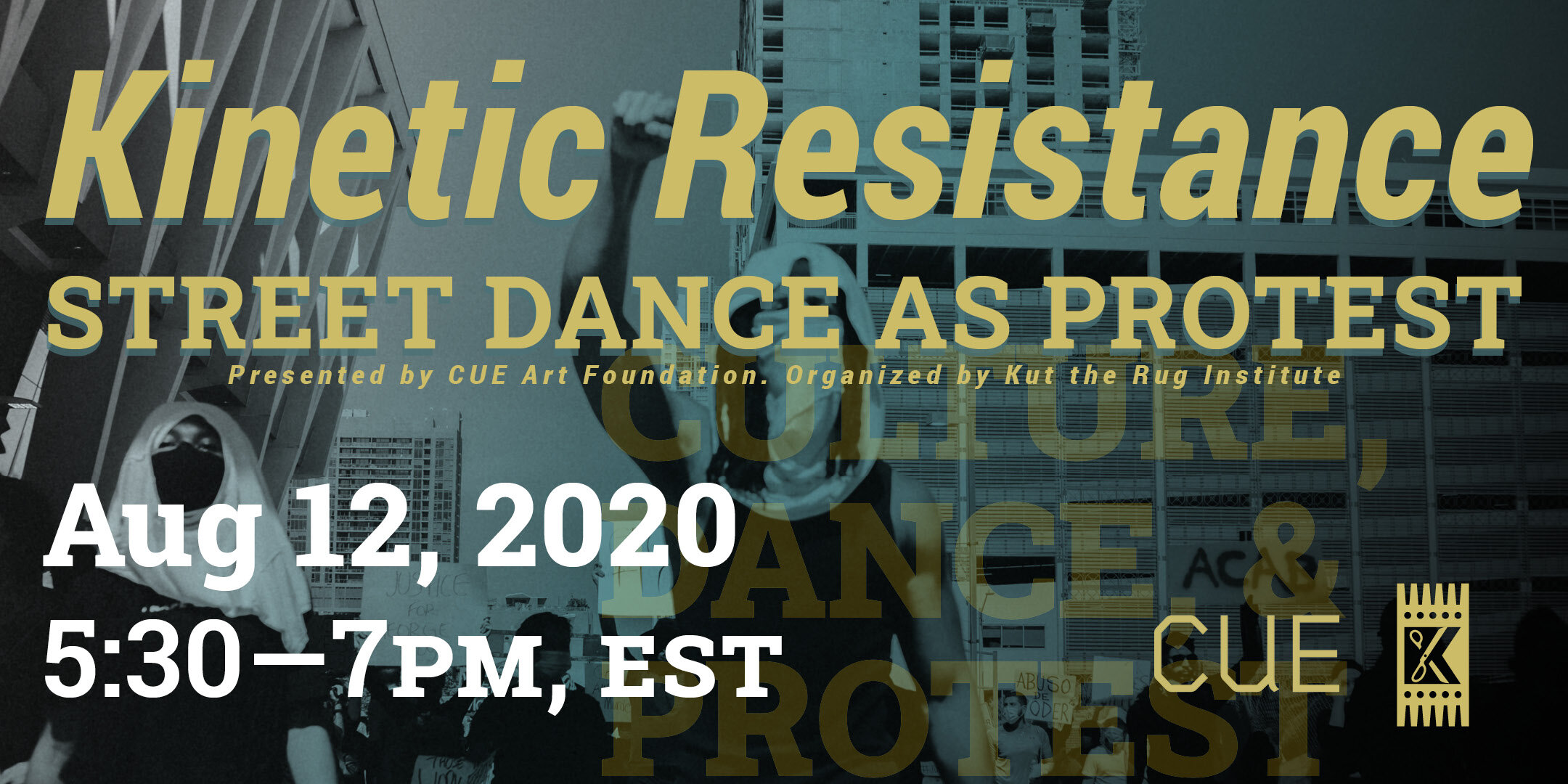Kinetic Resistance: Street Dance as Protest
With Shamell Bell, Naomi Bragin, James “Cricket” Colter, Imani Johnson, and Shireen “Shay” Rahimi
Organized by Kut The Rug Institute
Wednesday, August 12, 5:30pm ET
RSVP for Zoom link
Organized by Kut the Rug Institute and featuring visual artists, dancers, and scholars from the Vogueing, Breakin’, Hip-Hop, and House Dance communities, this panel discussion will expand and contextualize recent press coverage of Street Dancers deploying Black and gay vernacular dance practices in support of the ongoing protests, actions, and uprisings against police brutality, racial injustice, and white supremacy. Investigating how socio-political opposition is embedded in the practice of Street Dance and exploring the symbiotic relationship between Street Dance, visual culture, and surveillance, guest speakers will discuss dance as a physical, existential, collective, and spiritual form of resistance.
Discussing and analyzing video footage of themselves and their peers using their bodies at sites of protest, panelists will explore what resistance looks like and the ways in which both Street Dancers and the media exchange information to further their own ends. They will explore questions such as: How do dancers using their bodies as a form of protest enact a continuation of the long history of BIPOC resistance? How does dance change in the context of a protest — how is it interpreted or consumed when reproduced in a New York Times article versus featured in a televised PUMA commercial? How does media attention facilitate the surveillance of Black and brown bodies?
This event is free with a suggested donation to the following fund: Guadalupe Maravilla's Mutual Aid Fund for the Undocumented Community, which distributes cash directly to undocumented families in need who have been denied federal stimulus funds.
The panel will be live-captioned as well as recorded, captioned, and posted to our website after the event. If you have additional access questions or needs, please contact info@cueartfoundation.org (ideally with at least 48 hours before the event) and we will do our best to accommodate you.
Inspired by their 15-year conversation around the history, culture, politics, and practice of Street and Club Dances on the world stage, Brian Polite and Lafotographeuse (née Amanda Adams-Louis) founded Kut The Rug Institute during the COVID-19 shutdown. Kut The Rug Institute is a research-based artistic practice dedicated to developing and distributing creative products and scholarship about Street and Club Dances developed between 1970–the present. Kut The Rug Institute takes the form of a cultural think and do tank built to advance the conversation and information available about Street and Club dance forms.
In 2005, Lafotographeuse (née Amanda Adams-Louis) was introduced to Soulful House Culture by Brian Polite. Polite invited her to a party called Soul in the Hole, and attending it changed her lifestyle and artistic practice forever. She found her joy and artistic raison d’être on the dance floor to a post-disco soundtrack. Lafotographeuse is a photographer, cultural producer, educator, house music aficionado, and club kid. She earned her BFA in Photography from Pratt Institute and is an alumna of the Whitney Museum Independent Study Program. Lafotographeuse has exhibited her artwork at the Brooklyn Museum, MOCADA, CCCADI, and Aljira. She has received photography commissions from Dance Delight, MOPTOP, Ladies of Hip-Hop, UnKut Productions, KeiStar Productions, Afrokinetic, Alvin Ailey, Pepsi, Levi’s, Budweiser, and Urban World Film Festival. Lafotographeuse has produced public programs and art exhibits around Soulful House Music and Underground Street Dance Culture for twelve years. Currently, she serves as Operations Manager for the Club Culture Foundation and coordinates and facilitates the CUE Teen Collective, a full year, experiential visual art program for teens. During the COVID shutdown, Lafotographeuse and Polite founded Kut The Rug Institute, a Street Dance think tank.
In 2004, Brian Polite was plucked from NYC’s underground club scene to dance on stage by Adia Tamar Whitaker. This led to dancing under the direction of various choreographers, like Camille A. Brown and Nita Liem. He has facilitated dance workshops at Pratt Institute, Sarah Lawrence College, and Oberlin College; presented lecture-demonstrations on House Dance; and been a panelist at the 2018 Dance NYC Symposium and 2013 EMP Pop Conference at NYU. Polite is currently a member of Ase Dance Theatre Collective, co-founder of Afro Mosaic Soul Dance Collective, and co-founder of the Street Dance think tank Kut The Rug Institute.
Dr. Shamell Bell is a mother, community organizer, dancer/choreographer, and documentary filmmaker. Bell received her PhD in Culture and Performance at UCLA’s World Arts and Cultures/Dance department. She received her M.A. in Ethnic Studies from UC San Diego and B.A. with Honors in American Studies and Ethnicity specializing in African American Studies at the University of Southern California. Dr. Bell is currently a Lecturer of Somatic Practices and Global Performance at Harvard University and Lecturer of African and African American Studies at Dartmouth College. Her work on what she calls, "street dance activism" situates street dance as grassroots political action from her perspectives as a scholar, dancer, and choreographer. Shamell’s research examines street dance movements in South Central Los Angeles through an autoethnographic and performance studies lens. Her street dance experience includes featured roles in music videos, award shows, and tours. An original member of the #blacklivesmatter movement, she began as a core organizer with Justice 4 Trayvon Martin Los Angeles (J4TMLA)/Black Lives Matter Los Angeles and is what she now describes as an Arts & Culture liaison between several social justice organizations. She also consults for social justice impact in the TV, film, theater, and music industry.
Naomi Macalalad Bragin is a dancer, writer, educator and activist. Her 2014 essay Shot & Captured links the policing of blackness to Turf dance memorial films in Oakland CA. In the 1999 WTO Protests, she danced in the streets of Seattle & DC to intervene in police aggression tactics. She’s writing a book—Black Power of Hip Hop Dance: On Kinetic Politics—about black movement aesthetics which have contributed to the emergence of global hip hop/streetdance. She’s a former Bay Area Isadora Duncan Best Choreography nominee & NYC Hip Hop Theater Fest Future Aesthetics Artist.
James “Cricket” Colter is globally renowned and respected in the street dance community and beyond. From dance competitions to the concert dance stage, Colter has left his mark. Colter is a founding member of Rennie Harris Pure Movement (RHPM) and has worked with the company for over 16 years. During his time with RHPM, he taught and performed internationally (including Rennie Harris’ Bessie award-winning "Rome and Jewels"), and led the educational outreach programs for the company. Colter's resume includes: teaching at hip hop festivals worldwide, as well as the famous ADF, Bates, and Jacobs Pillow Dance Festival held annually in Maine; featured dancer in television commercials, and the successful Disney movie “Step Up 2 the Streets”; concert performances with Madonna and Chris Brown; music videos for recording artists including Boys II Men, KRS-1, Will Smith, Eve, Avil Lavigne, Fall Out-Boy; and host of MTV Japan's “Dreamers” television show.
Professor Imani Kai Johnson (Critical Dance Studies, UCR) researches Africanist aesthetics, global popular culture, and ritual and social street dances. Her manuscript, Dark Matter in Breaking Cyphers: Africanist Aesthetics in Global Hip Hop, is with Oxford University Press. She also directs the Show & Prove Hip Hop Studies Conference Series.
Shireen Rahimi is a first-generation Iranian-American dancer from the Bay Area. Her dance journey began with the late Gary Kendell, founder and mastermind of the Jabbawockeez, who were the winners of the first season of America's Best Dance Crew. She spent six years training with Gary before his passing in 2008. In 2012, Rahimi moved to NYC to train in Vogue and gain a deeper understanding of underground ball culture. In that same year, Rahimi met Omari Mizrahi at Esco’s Vogue Knights, the city's most well known weekly ball competition, and the rest is history. Through the blessings of Omari and Jack Mirahi, Rahimi joined House of Mizrahi and spent the next seven years competing in Women's Performance and Best Dressed. Rahimi started learning afrobeat and traditional West African styles under the direction of Omari Wiles as he was developing his company and the style known as Afrik Fusion. She is one of the first company members on Les Ballet Afrik and also serves as the company manager. She is the Overall Overseer of House of Oricci and the Overall USA Mother of the International Kiki House of Angels. In addition to her dance career, Rahimi has served as a Production Coordinator in the entertainment industry for over ten years. Rahimi's first internship started at Clear Channel Radio which shortly turned into working with Grammy Nominated recording artist, Jidenna, as his Production Manager and Dance Coordinator. Within the ballroom scene, Rahimi is the Pre-show coordinator for OTA Weekly, a weekly mini ball series considered to be the new Vogue Knights. Her goal is to take Vogue to her mother country of Iran and organize dance battles for the Iranian dance community.



